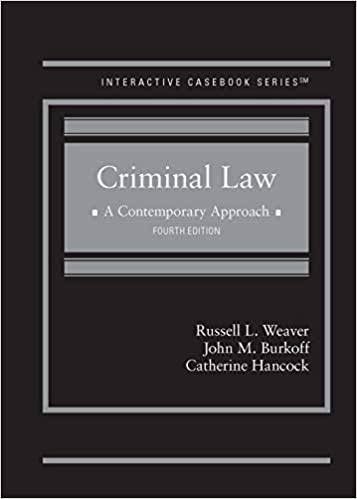Question
Business Judgment Rule The Business Judgment Rule in general provides protection for corporate officers and directors over their decision making process. The Rule acts as
Business Judgment Rule
The Business Judgment Rule in general provides protection for corporate officers and directors over their decision making process. The Rule acts as a shield for lawsuits being brought against them. The Rule in court is a defense for any liability regarding corporate decisions that turn out wrong - it presumes that good faith business decisions are valid.
Directors and officers are not liable to the corporation or its shareholders for honest mistakes of judgment Business Judgment Rule in Massachusetts
Massachusetts Business Corporate Statute M.G.L. Chapter 156D Section 7.44 The Business Judgment Rule is a core protection for corporate officers and directors. The general idea is that courts will not second guess fully informed business decisions made by disinterested officers and directors in good faith. The Rule acts like a shield against suits by Shareholders for corporate financial lawsuits. Massachusetts' version is found in Chapter 156D Sections 8.30 (BOD) and 8. 42 (Co Officers) Copyright 2015 Pearson Education, Inc. 10/10/2022 2 Business Judgment Rule in Massachusetts
Massachusetts Business Corporate Statute M.G.L. Chapter 156D Section 8 Courts understand not every business decision will turn out to be a good one, and that with the advantage of hindsight it may be easy to be critical. In court, the Business Judgment Rule is a defense to liability for decisions that turn out to hurt a company financially - good faith business decisions are valid even with a financially distressing outcome.
Business Judgment Rule in Massachusetts
Massachusetts Business Corporate Statute M.G.L. Chapter 156D Section 8 In order to be protected, the Corporate Board of Directors must:
1. Be "disinterested" in the decisions they make for the company;
2. Act with Due Care ("that a person in a like position would reasonably believe appropriate under similar circumstances.");
3. Act in good faith (must reasonably believe that your decision is in the best interests of the company.
1. Review this PowerPoint regarding another review of the Massachusetts Business Judgment Rule:
2. Review the Business Judgment Case Analysis provided in the PowerPoint regarding the hypothetical automotive company and the decision by the BOD to invest in newly designed vehicles;
3. Discuss the application of the Massachusetts Business Judgment Rule to the automotive company case facts.
In your opinion, should the Massachusetts Business Judgment Rule protect the Automotive Company's Board of Directors from a shareholder lawsuit?
second question
2. What do you think of the Massachusetts Business Judgment Rule acting as a legal shield for corporate board of directors in the provided automotive case analysis?
Step by Step Solution
There are 3 Steps involved in it
Step: 1

Get Instant Access to Expert-Tailored Solutions
See step-by-step solutions with expert insights and AI powered tools for academic success
Step: 2

Step: 3

Ace Your Homework with AI
Get the answers you need in no time with our AI-driven, step-by-step assistance
Get Started


